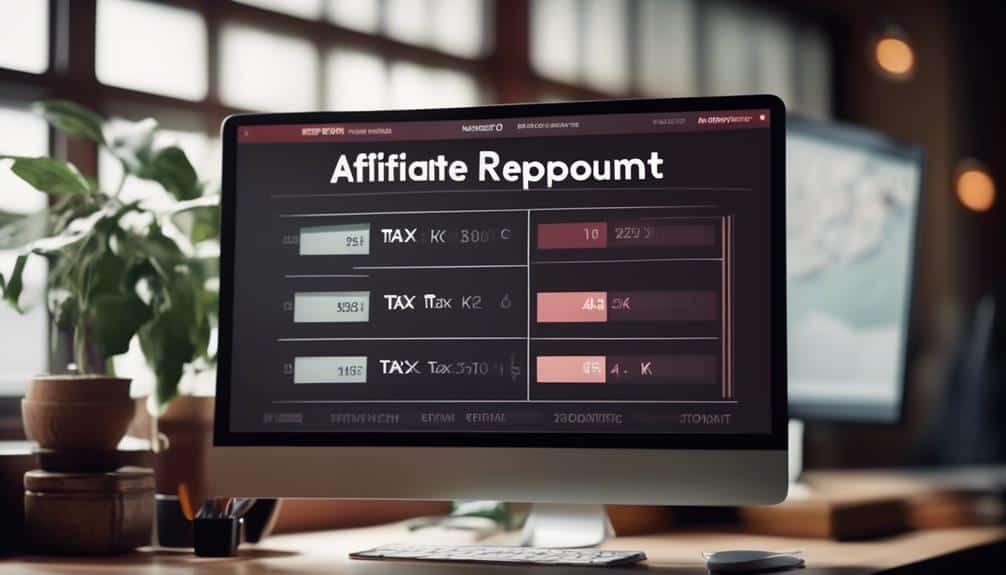Demystifying Tax Reporting for ClickBank Affiliates: A Step-by-Step Approach
Ever wondered how to navigate the complexities of tax reporting as a ClickBank affiliate? Understanding your tax obligations and ensuring compliance can be a daunting task for many.
However, by breaking down the process into manageable steps, you can gain clarity and confidence in handling your tax responsibilities. From determining the necessary forms to calculating your earnings and reporting taxable income, each step plays a crucial role in your financial well-being.
Stay tuned to uncover a practical guide that will demystify tax reporting for ClickBank affiliates, providing you with a clear path to financial peace of mind.
Key Takeaways
- Keep detailed records of financial transactions for maximizing deductions and accurate reporting
- Utilize specific tax forms like 1099-MISC, Schedule C, Form 1040, and Form 8829 for tax reporting
- Regularly track ClickBank earnings and deductions to report taxable income accurately
- Stay informed about tax laws and international considerations to ensure compliance and avoid surprises
Understanding Tax Obligations as an Affiliate

As a ClickBank affiliate, it's essential to understand your tax obligations to ensure compliance with relevant laws and regulations. One crucial aspect to grasp is the availability of tax deductions that can help lower your taxable income. Common deductions for affiliates may include expenses related to advertising, website maintenance, and software subscriptions. By keeping detailed records of these expenditures, you can maximize your deductions and reduce your overall tax liability.
Another vital aspect is meeting filing deadlines to avoid penalties and interest charges. As a ClickBank affiliate, you're typically considered self-employed, which means you may have different deadlines than traditional employees. It's essential to stay organized and aware of when your tax returns are due to the IRS to prevent any unnecessary fines.
Understanding your tax obligations, taking advantage of available deductions, and meeting filing deadlines are all key components of maintaining compliance as a ClickBank affiliate. By staying informed and proactive in your tax reporting, you can navigate this aspect of your business with confidence and peace of mind.
Determining Required Tax Forms
Determining the tax forms required for your status as a ClickBank affiliate involves identifying the specific documentation needed to accurately report your income and expenses. Following IRS guidelines is crucial to ensure compliance and avoid any penalties. As a ClickBank affiliate, understanding which tax forms to use can streamline the reporting process and help you maximize your tax deductions.
Required Tax Forms for ClickBank Affiliates
| Tax Form | Description |
|---|---|
| Form 1099-MISC | Reports miscellaneous income, like affiliate earnings |
| Schedule C | Used to report profit or loss from business income |
| Form 1040 | Main individual tax form for reporting income |
| Form 8829 | For claiming home office expenses as deductions |
Calculating ClickBank Earnings

How do you accurately compute your ClickBank earnings to ensure precise tax reporting? Calculating your ClickBank earnings involves understanding your earning potential and the payment methods used by ClickBank. To start, log in to your ClickBank account and navigate to the reporting section. Here, you can access detailed information about the sales you've generated as an affiliate. Look for metrics such as total sales, commissions earned, and chargebacks to get a comprehensive view of your earnings.
Next, factor in any fees or deductions that ClickBank applies to your earnings. These deductions may include processing fees or affiliate commission rates. By subtracting these fees from your total earnings, you can arrive at your net income from ClickBank promotions.
It's crucial to keep track of your earnings regularly, especially if you're engaging in multiple promotional campaigns. By staying organized and understanding the nuances of ClickBank's payment structure, you can accurately calculate your earnings and ensure seamless tax reporting.
Reporting Taxable Income
Regularly review and meticulously document your ClickBank earnings to ensure accurate reporting of taxable income. Keeping track of your earnings is crucial for determining if you meet the income thresholds that require reporting to the tax authorities.
ClickBank doesn't withhold taxes from your payments, so it's your responsibility to report this income correctly. When reporting taxable income, remember to consider any eligible deductions that could lower your overall tax liability. These deductions could include marketing expenses, website maintenance costs, or any other expenses directly related to your ClickBank affiliate activities.
By reporting deductions accurately, you can reduce the taxable portion of your earnings, potentially lowering the amount you owe in taxes. Staying organized and keeping detailed records of your earnings and expenses will make the tax reporting process smoother and help you avoid any issues with the tax authorities.
Staying Compliant With Tax Laws

To ensure compliance with tax laws, meticulously document all financial transactions related to your ClickBank affiliate activities. Keeping detailed records will not only help you stay organized but also make it easier to report your income accurately. When it comes to tax deductions, make sure you are aware of what expenses can be deducted to minimize your taxable income. For example, expenses related to advertising, website maintenance, and other costs directly associated with your affiliate business may be eligible for deductions.
When dealing with international sales as a ClickBank affiliate, it's crucial to understand the tax implications that may arise. Different countries have varying tax laws, and you may be subject to additional taxes or reporting requirements when selling to customers overseas. Stay informed about the tax regulations in the countries you are conducting business with to avoid any surprises come tax time.
Tax Deductions Table:
| Expense Category | Eligibility for Deduction |
|---|---|
| Advertising | Yes |
| Website Maintenance | Yes |
| Affiliate Tools | Yes |
| Travel Expenses | Dependent on Circumstances |
Frequently Asked Questions
Can Clickbank Provide a Breakdown of the Specific Earnings That Need to Be Reported for Tax Purposes, Such as Affiliate Commissions, Bonuses, or Refunds?
Yes, ClickBank can provide a breakdown of earnings for tax reporting. You'll receive details on affiliate commissions, bonuses, and refunds. This breakdown helps you accurately report income, claim tax deductions, and understand international payment currencies.
Are There Any Specific Deductions or Expenses That Clickbank Affiliates Can Claim to Reduce Their Taxable Income?
You can claim tax deductions as a ClickBank affiliate, reducing taxable income. Eligible expenses like advertising costs, website maintenance, and relevant software purchases can be deducted. Keep detailed records to support your claims and maximize savings.
How Does the Tax Reporting Process Differ for Affiliates Located in Different Countries or Regions?
When dealing with tax regulations, international affiliates must navigate varying reporting requirements based on their location. Understanding local tax laws, filing deadlines, and potential tax treaties can help streamline the process and ensure compliance with the respective authorities.
Are There Any Potential Tax Implications for Affiliates Who Receive Payments in Foreign Currencies Through Clickbank?
When receiving payments in foreign currencies through ClickBank, there may be tax implications due to foreign exchange rates. Ensure you understand how these fluctuations can impact your income and consult with a tax professional for guidance.
What Are the Consequences of Not Accurately Reporting Clickbank Earnings or Failing to Comply With Tax Laws as an Affiliate?
Failing to accurately report ClickBank earnings or comply with tax laws could lead to serious consequences. Penalties, audits, and legal troubles may arise. Ensure compliance to avoid financial and legal risks associated with inaccurate tax reporting.
Conclusion
In conclusion, navigating tax reporting as a ClickBank affiliate may seem daunting, but with a step-by-step approach, you can demystify the process.
Understanding your tax obligations, determining required forms, calculating earnings accurately, reporting taxable income, and staying compliant with tax laws are essential steps to ensure financial success.
By following these guidelines, you can confidently manage your tax reporting responsibilities and focus on growing your affiliate business.








